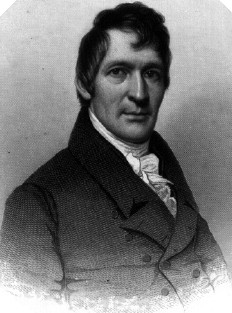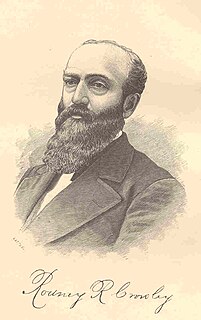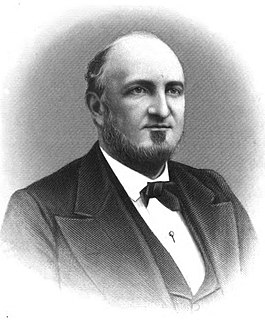Life
He was the son of Col. David Breakenridge McNeil (b. 1787 Charlotte, Vermont, District Attorney of Essex County from 1828 to 1833, and Collector of the Port of Plattsburgh during the administration of President Andrew Jackson).

Charlotte is a town in Chittenden County, Vermont, United States. The town was named for Sofia Charlotte of Mecklenburg-Strelitz, Queen of England and wife of King George III. The population of the town was 3,754 at the 2010 census.

Andrew Jackson was an American soldier and statesman who served as the seventh president of the United States from 1829 to 1837. Before being elected to the presidency, Jackson gained fame as a general in the United States Army and served in both houses of Congress. As president, Jackson sought to advance the rights of the "common man" against a "corrupt aristocracy" and to preserve the Union.
He was an invoice clerk at the Customs House in New York City under Collectors Cornelius P. Van Ness and Cornelius V. W. Lawrence (1844–1849). Afterwards he was for seven years Clerk of Clinton State Prison. Then he worked in the office of the Secretary of State of New York under David R. Floyd-Jones and Horatio Ballard (1860–1863). He was Warden of Auburn State Prison from January 1864 to 1865. During his administration, Auburn Prison made a profit of $16,000, whereas during the first year of his successor the prison had a deficit of $40,000. "McNeil came out of office poor. As to his successor in that respect, we leave the matter to general rumor." [1]

The City of New York, usually called either New York City (NYC) or simply New York (NY), is the most populous city in the United States and thus also in the state of New York. With an estimated 2017 population of 8,622,698 distributed over a land area of about 302.6 square miles (784 km2), New York is also the most densely populated major city in the United States. Located at the southern tip of the state of New York, the city is the center of the New York metropolitan area, the largest metropolitan area in the world by urban landmass and one of the world's most populous megacities, with an estimated 20,320,876 people in its 2017 Metropolitan Statistical Area and 23,876,155 residents in its Combined Statistical Area. A global power city, New York City has been described as the cultural, financial, and media capital of the world, and exerts a significant impact upon commerce, entertainment, research, technology, education, politics, tourism, art, fashion, and sports. The city's fast pace has inspired the term New York minute. Home to the headquarters of the United Nations, New York is an important center for international diplomacy.
The Collector of Customs at the Port of New York, most often referred to as Collector of the Port of New York, was a federal officer who was in charge of the collection of import duties on foreign goods that entered the United States by ship at the Port of New York.

Cornelius Peter Van Ness was an American politician and diplomat who served as the 10th Governor of Vermont from 1823 to 1836 and Envoy Extraordinary and Minister Plenipotentiary to the Kingdom of Spain from 1829 to 1836. Van Ness was a Democratic-Republican and later a Democrat.
In 1863, he ran on the Democratic ticket for Inspector of State Prisons but was defeated by James K. Bates. In 1864, he ran again for Inspector of State Prisons but was defeated by David P. Forrest. In 1868, he ran again, and was elected. He was in office from 1869 to 1871, but was defeated for re-election in 1871 by Thomas Kirkpatrick.
The Inspector of State Prisons was a statewide elective office created by the New York State Constitution of 1846. At the New York state election, 1847, three Inspectors were elected and then, upon taking office, so classified that henceforth every year one Inspector would be elected to a three-year term. The Prison Inspectors appointed wardens and keepers, and supervised the prison administration in general. They were required to visit jointly four times a year each one of the state prisons. Besides, each one of the Inspectors was allotted the special care to one of the then existing three state prisons where he had to attend to business for at least one week per month.
James K. Bates was an American physician and politician from New York.

The 1862 New York state election was held on November 4, 1862, to elect the Governor, the Lieutenant Governor, a Canal Commissioner, an Inspector of State Prisons and the Clerk of the Court of Appeals, as well as all members of the New York State Assembly.

The 1864 New York state election was held on November 8, 1864, to elect the Governor, the Lieutenant Governor, a Canal Commissioner and an Inspector of State Prisons, as well as all members of the New York State Assembly.

The 1868 New York state election was held on November 3, 1868, to elect the Governor, the Lieutenant Governor, a Canal Commissioner, an Inspector of State Prisons and the Clerk of the Court of Appeals, as well as all members of the New York State Assembly.

The 1874 New York state election was held on November 3, 1874, to elect the Governor, the Lieutenant Governor, a judge of the New York Court of Appeals, a Canal Commissioner and an Inspector of State Prisons, as well as all members of the New York State Assembly and one member of the New York State Senate.

The 1876 New York state election was held on November 7, 1876, to elect the Governor, the Lieutenant Governor, a judge of the New York Court of Appeals, a Canal Commissioner and an Inspector of State Prisons, as well as all members of the New York State Assembly and two members of the New York State Senate. Besides, two constitutional amendments were proposed - to abolish the elected Canal Commissioners and appoint a Superintendent of Public Works instead; and to abolish the elected New York State Prison Inspectors and appoint a Superintendent of State Prisons instead - and both were accepted by the electorate.
Gideon John Tucker was an American lawyer, newspaper editor and politician. In 1866, as Surrogate of New York County, he wrote in a decision of a will case: "No man's life, liberty or property are safe while the Legislature is in session."
James Jackson Jr. was an American businessman and politician from New York.
William Pitt Angel was an American lawyer and politician from New York.

The 1863 New York state election was held on November 3, 1863, to elect the Secretary of State, the State Comptroller, the Attorney General, the State Treasurer, the State Engineer, a Judge of the New York Court of Appeals, a Canal Commissioner and an Inspector of State Prisons, as well as all members of the New York State Assembly and the New York State Senate.

The 1867 New York state election was held on November 5, 1867, to elect the Secretary of State, the State Comptroller, the Attorney General, the State Treasurer, the State Engineer, a Judge of the New York Court of Appeals, a Canal Commissioners and an Inspector of State Prisons, as well as all members of the New York State Assembly and the New York State Senate.

The 1871 New York state election was held on November 7, 1871, to elect the Secretary of State, the State Comptroller, the Attorney General, the State Treasurer, the State Engineer, a Canal Commissioner and an Inspector of State Prisons, as well as all members of the New York State Assembly and the New York State Senate.

Edwin Oscar Perrin was an American lawyer and politician.

The 1875 New York state election was held on November 2, 1875, to elect the Secretary of State, the State Comptroller, the Attorney General, the State Treasurer, the State Engineer, a Canal Commissioner and an Inspector of State Prisons, as well as all members of the New York State Assembly and the New York State Senate.
Thomas Kirkpatrick was an American politician from New York.

Rodney Rufus Crowley was an American lawyer and politician from New York. He was a New York Inspector of State Prisons from 1876 to 1877.
David P. Forrest was an American politician from New York.

Benjamin Platt Carpenter was an American lawyer and politician from New York and Montana. He was Governor of the Montana Territory from 1884 to 1885.
James R. Angel was an American lawyer and politician from Washington Territory and New York.
Jacob Worth was an American politician from New York.
George H. Harlow was an American politician. Born in New York, he was originally a student of carpentry and architecture. He entered the mercantile business soon after he moved to Pekin, Illinois. In 1860, he was elected clerk of the circuit court, then co-founded a Union League of America chapter, later serving at the state level of the organization. Harlow was the personal secretary to Governor Richard J. Oglesby and oversaw Camp Butler starting in 1864. He was elected assistant Illinois Secretary of State for four years starting in 1868, then was the secretary from 1872 to 1880. After his terms expired, he traded commodities in Chicago.










